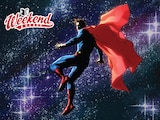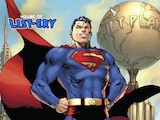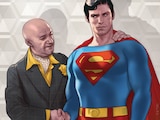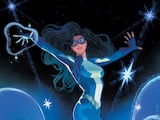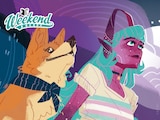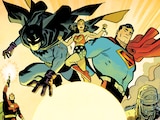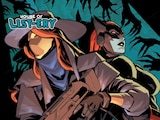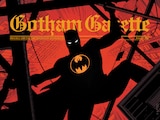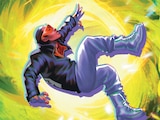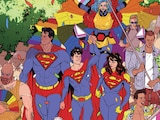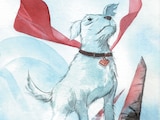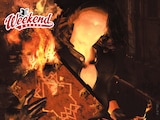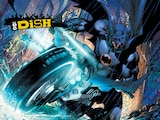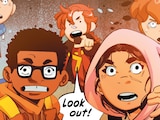On The CW’s Batwoman, Luke Fox has only recently stepped out of his computerized comfort zone and joined Ryan in the field, donning the high-tech suit created by his father while fighting for justice as Batwing. However, Camrus Johnson, the man who has played Luke since the series debuted in 2019, has been trying new things all of his life. First and foremost an actor, Johnson has also successfully taken on singing, sketch comedy, screenwriting and scripting comics. Now he’s moved on to directing, having helmed tonight’s pivotal new episode of Batwoman and an acclaimed new animated short that was recently nominated for an NAACP Image Award.
Johnson’s clearly having a much-deserved moment, but so is the series on which he stars. After a highly successful second season that introduced Javicia Leslie as the show’s new hero, Batwoman’s third season has allowed the dynamic between the series’ characters to fully bloom as Ryan, Luke, Sophie and Mary contend with the remnants of Batman’s rogues’ gallery and the always delightful Rachel Skarsten as Kate Kane’s unhinged sister, Alice. Johnson’s episode, “Broken Toys,” brings back Marquis Jet, Ryan’s Joker-like half brother who both controls Wayne Industries and knows that his sister is secretly Batwoman. It combines everything that Batwoman has become known for—family, an evolving sense of justice and sheer, unhinged unpredictability—into one of the strongest chapters yet of a show that seems to be getting better with each season.
With the episode about to air, the time seemed perfect for a chat with Johnson about Batwoman and his first stint in the director’s chair, including what it was like playing in the Joker’s playground and whether his work writing comics has helped him transition into directing.

Over your life and career, you’ve worn many hats. You’re an actor, obviously. You’ve been involved with activism. You’ve written comics and now you’re directing. Did you always want to add this to your resume, or did your interest in it come later?
Acting came first. Acting came when I was fifteen and singing came when I was sixteen. I think my goal was always to be an actor, singer and dancer on Broadway, and that did not happen. So, I got into on-camera acting, and I just started writing because I was acting for writing classes. That was just one of the ways that I made money to survive in New York. From those classes, I learned how to write and then I started doing sketch comedy with my friends and I asked if they’d mind if I directed a couple of shows. But I only asked that because some of our directors weren’t good! We were cracking jokes and they weren’t making the jokes funny. I knew I could make the jokes funny, but I wasn’t the director. So, I asked if I could direct just so I could tell them how I thought we should do some of these things.
So, I got a taste of directing early, but not because I wanted to be a director, just because I wanted to fix that show a little bit. But then as time went on, writing got bigger and then directing got bigger. So, to answer your question, nothing was planned. It all sort of just happened. I never thought I was going to be a director, especially of TV. And on the writing side, I certainly never thought I was going to be a film or feature writer, or comic book writer. That was never part of the plan! So, I always have to thank acting for introducing me to everything else. Without acting, I wouldn’t be doing any of it.
What’s it like directing people you know and work alongside? Does it make it easier, or do you feel more pressure because you don’t want to let them down?
Personally, I think it makes it easier. I understand why some people might find it harder, but I love working with my friends. With the live action short film that I directed, “Blue Bison,” the whole cast were my friends and it was so easy because I could talk to them however I needed because they got me. They understood how my brain works. This was no different. The cast of Batwoman is incredible. From the beginning, they were just so supportive. They said, “Whatever you need, whenever you need it, however you need it, we will do it. We will figure it out.”

They weren’t messing around when they said that. They really brought their A-game to my episode. There was this scene with Rachel (Skarsten) and Nicole (Kang) in the car, they did the scene and did such a great job, the way they always do. So, I walked up to them, and I said, “Okay, let’s try this a completely different way.”
So, they did it and they knocked it out of the park, and I came back and said, “That was dope. Let’s do it a third completely different way.”
And Rachel was like, “I never thought about the scene like that. I never would have seen it in all these different ways.”
As an actor, I always love when I get to do a scene and I feel like I’ve done every version of it. I’ve given it my all. So, no matter what you choose in the edit, I gave my best performance. The actors, they did that for the entire two weeks. They just gave me so much fun to work with, and they really trusted me and listened. It was just great. They were so great.
How did “Broken Toys” wind up being the episode?
I’m not really sure (Executive Producer) Caroline Dries’ idea behind it, but in order to get my Director’s Guild of America training, I had to have on paper what episode I was going to direct very early on. So, Caroline signed me on to episode 311 before we even shot this season, and I didn’t know what it was going to be. I’m not even sure if she knew what it was going to be. But I was already feeling pretty good about it because it was late in the season, so I knew there would be some really cool, interesting things happening in it because a lot of things would be coming to a head. So, when I read the script, it was like, “Oh, you had time to think about this, Caroline, because it’s clear you wrote this for me!”
They know I’m a huge Joker fan and there was so much Joker stuff in it. I didn’t know what I was getting into until I read the script maybe a week before prepping, and I was just thinking, “I’m about to go crazy with this episode!”
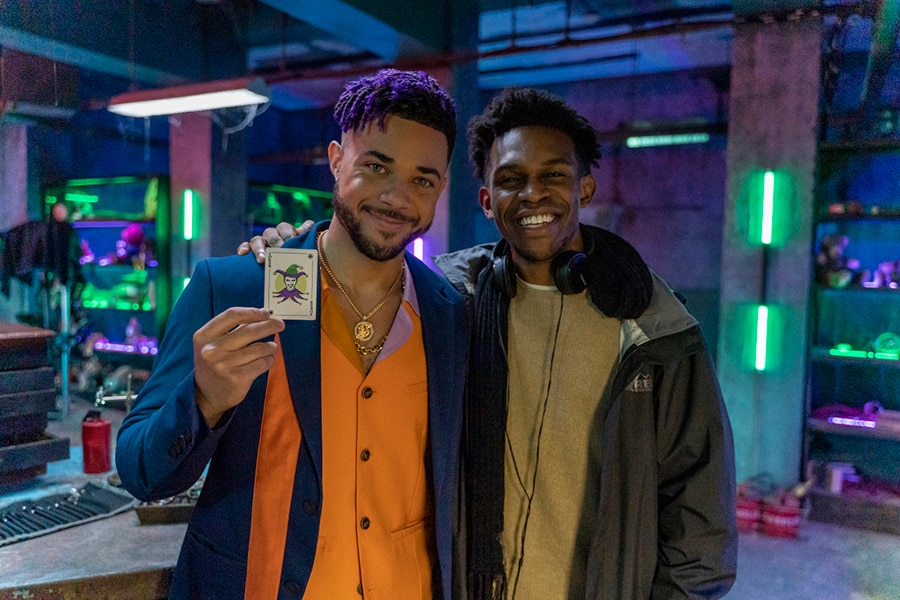
On that note, you got to direct Nick Creegan in full on villain mode. His character is obviously inspired by the Joker, but how do walk the line of keeping him in the spirit of that villain while also remaining his own character?
He does such a good job with. I talked to Nick and told him how important the Joker laugh is to me. It’s such a staple of the character. Nick put in so much work because before he did the show, he found his Joker laugh and he practiced it and perfected it. I told him early on that I was going to have him laughing in the episode anywhere that it would make sense. We could cut some out in the edit, but I wanted him to make people remember that the Joker makes you laugh and smile, but ultimately feel uncomfortable. That’s one of the reasons he’s one of my favorite villains and I really wanted to play with that.
But also, what’s fun about this episode is I really got to dive into my Joker nerdiness. I got to add all of these props and these fun little things. A lot of that was not scripted. I just went to my props team and I asked for maybe 15-20 props, and they made all of them, which was amazing and just goes to show how incredible our crew is. They really went all out for me in this episode.
But yeah, it was fun working with Nick. Since Marquis just woke up at the end of the previous episode, I said to him, “Bro, you are unhinged. You are ready to kill this woman. Give me that. I want you to have fun and give me that Joker happiness because the Joker is the most creepy when he is laughing and doing something evil.”
I wanted him to continually have that in his head. I wanted him to continually remind himself that this was fun for him—making Batwoman know that you were getting her into a corner.
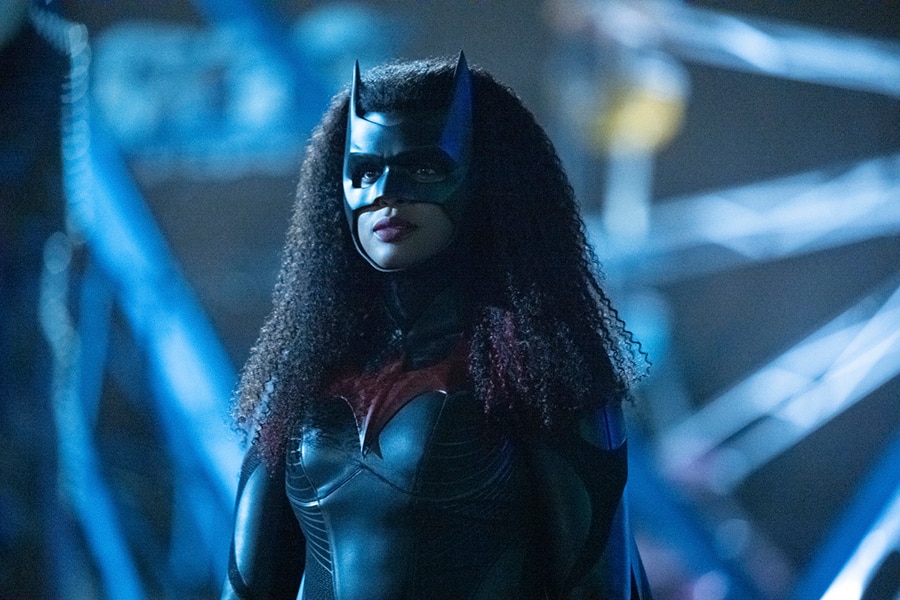
There’s a growing number of DC actors who have directed episodes of their shows. Caity Lotz, Danielle Panabaker, Tom Cavanagh and David Ramsey have all directed multiple episodes now. Would you like to become more of a regular like them?
Maybe. I did talk to David quite a bit. I love talking to him about directing. I also talked to Chyler (Leigh). She would check in to ask how it was going, which was really cool.
I don’t know, man. Directing TV is so new to me. It was an idea that wasn’t even my own. It was the crew’s idea. They kept pushing me. They saw the short films and told me I had to direct an episode, and I enjoyed it so much more than I expected. I would definitely love to get some more TV experience. I would love to keep diving into it. But I also am such a huge fan of different vibes, so would I love to do another superhero show? Maybe. Would I want to do an HBO show, a USA show, a TBS show? I kind of want to just taste all of the vibes and see where I could stick. That’s one of the most interesting things about filmmaking to me—doing live action, doing animation, horror, comedy, drama. How do I do all of my interests well? How do I take every piece of me and put it onto the screen?
So, yeah, since people are reacting to the episode so strongly, I would like to have another crack at it and see how far I could go. We’ll have to see what happens.
You wrote a pretty great Batwing short for DC last year. Are there any similarities you’ve found between writing comics and directing TV? Or are they both pretty different? It occurred to me that both involve other people bringing what’s in your mind to visual life.
There are many connections. One of them is the storyboarding of it all. When it comes to comics, you have to write out every panel, which means you have to envision exactly what it’s going to look like and explain to your artist detail-by-detail what it’s going to look like. I learned that from animation. I watched a Peter Ramsey interview a year or two ago, he’s one of the directors of Into the Spider-Verse, and he said that when it comes to animation, you have to constantly repeat what you’re looking for.

With comic books, it’s the same. When you are explaining a panel, you have to be very specific about what it is. With on-camera directing, it’s the same. We have a props guy, a camera team, wardrobe, makeup, hair—we have all these people, all these meetings and we’re shooting multiple episodes at once. So, you need to constantly make sure that you’re repeating what you need because people are human. They may forget. So, if you want to make it easier for yourself, just constantly make sure that everyone is on the same page.
With comic books, it gets back to storyboarding too because comics are just storyboards. They’re shots. You want to read them as if you’re watching something. So, when I’m directing, I plan everything in my head kind of like a comic book because I need to see everything in moments. When I see them as pictures in my head, you start putting them together. That’s what a movie is—it’s pictures back-to-back-to-back. So, yes, there is a strong connection between the three: comic books, animation and live action.
You’ve also written and directed a few shorts, including a new animated one that’s been making its way around the festival circuit. What can you tell us about “She Dreams at Sunrise”?
I’m so honored that I got to make this film, and the fact that it’s NAACP Image Award-nominated is just mind-blowing. I’m so blown away and I cannot wait to meet all of the other nominees.
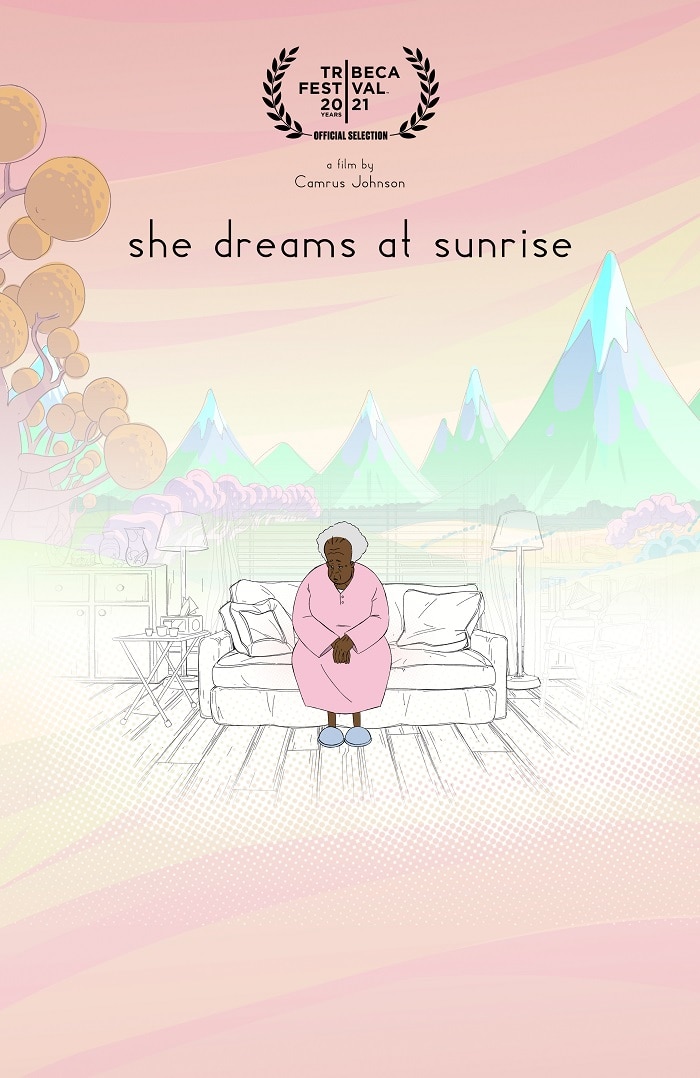
“She Dreams at Sunrise” is based off of some true events. I was my great aunt’s caretaker for two years, and I’ve always wanted to tell a version of that story. That time and that beautiful woman are the reason I am who I am right now. The film is about an elderly woman who is stuck in her mundane reality, and she uses her dreams to escape that reality. It’s her great nephew’s job to help connect her with what she’s truly missing. That’s what happened in real life. My aunt would hallucinate, and she’d sort of be stuck between these two worlds and it was my job to keep her happy and keep the jokes flowing, and to keep her grounded and realize that she was in the real world. This is my sort of animated take on that, only instead of the darkness of what it really was, with her hallucinating and being scared, this woman is deciding to escape with her dreams into this other magical world where she gets to be who she wants to be and see what she wants to see.
In a way, it’s my “what if?” story, and I won’t explain exactly what that means because it kind of ruins what the ending of the short is, but the short means a lot. It finally inspired me to get the feature film version of my story out. I wrote the first draft of it years ago and it’s just a hard time to get back into, but seeing how I could make this animated, beautiful, heartwarming version of it really showed me that I need to get this story out there, especially for the other caretakers in the world. We don’t know it, but I’ve met so many people who I’ve talked to about my time caretaking, and they’re like, “Yeah, I took care of my mom for a couple of years.” “I took care of my dad.” “I took care of my brother.” “I took care of my grandmother.” It’s a very normal thing and many times I felt alone when I was doing it. This short and this eventual movie will tell people that they’re not alone and that there are other people out there who have gone through it. You come out the other side sometimes stronger. Sometimes a lot, lot stronger.
"Broken Toys" airs tonight at 9 p.m. (8 p.m. CST) on The CW. For more on Batwoman, Batwing and other heroes that go bump in the night, visit our official Batwoman series page.

